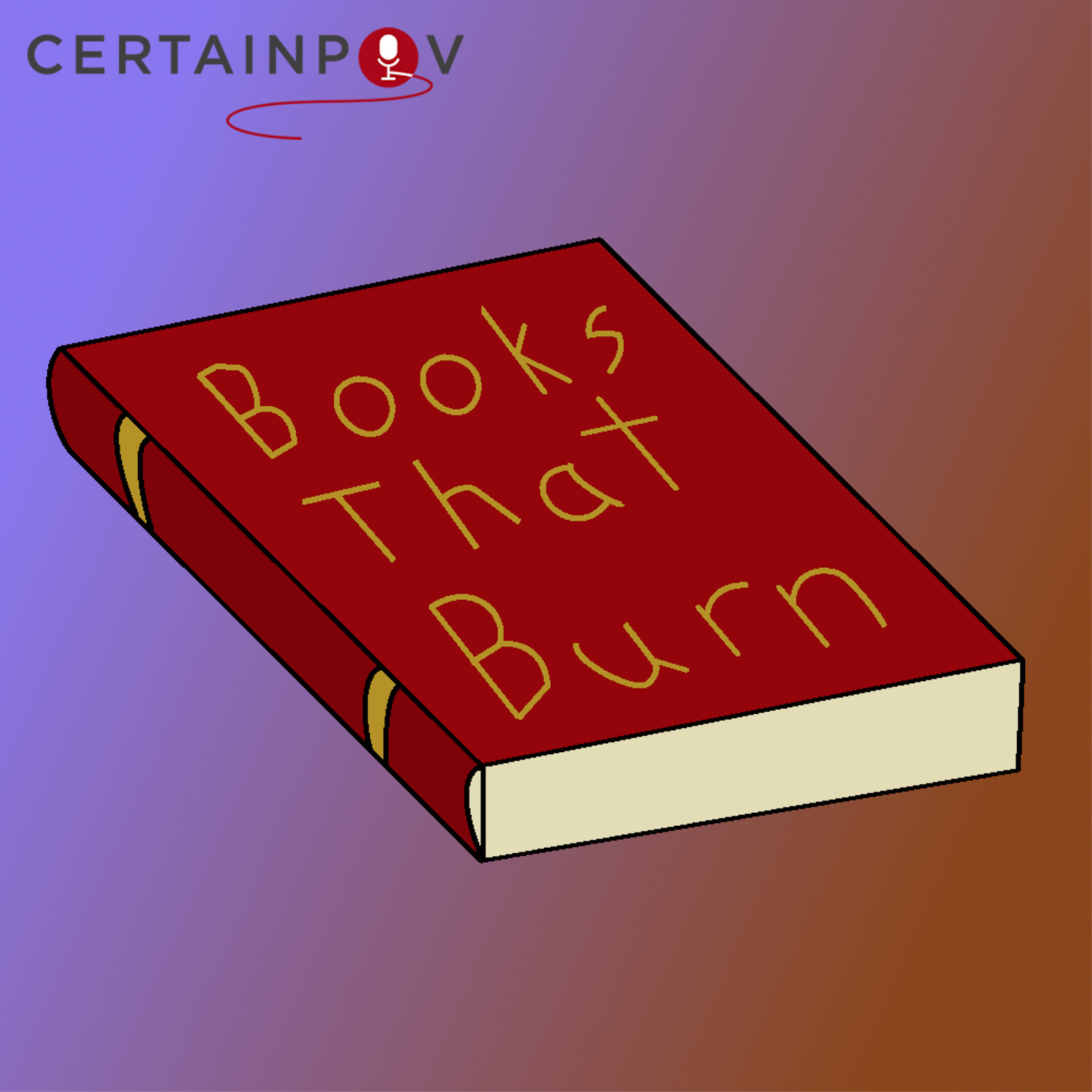Episodes

7 days ago
Two Essays on Generative AI
7 days ago
7 days ago
Hello Patrons and general audience members! Welcome to a two-part reading of some Books That Burn essays by Robin. Thank you to Case Aiken, who receives a monthly Patron shoutout. These two essays are both about my thoughts on generative AI, but neither was long enough to be an episode on its own.
As a reviewer of books, I'm very concerned with the news and societal reception of the resource-guzzling plagiarism machine, especially when Indie authors are among those most immediately harmed by having their work stolen and struggling to stand out in a sea of AI-generated slush flooding the ebook market. While I understand that there are useful versions of AI which aren't used to push out garbage no one actually wants to read, the existence of that particular firehose does need to be addressed.
With that out of the way, please enjoy my reading of two essays about generative AI.
-----
The Problem Is Not That You Want What Generative AI Promised, The Problem Is That They Lied About Whether It Could Deliver (01:14) [Link to Full Text]
A Reflection on Path-Dependent Processes (07:26) [Link to Full Text]

Monday Nov 04, 2024
October Daye / Inheritance - Essay Series Part Four: When a Villain Lives
Monday Nov 04, 2024
Monday Nov 04, 2024
Hello Patrons and general audience members! Welcome to another Books That Burn essay by Robin. Thank you to Case Aiken, who receives a monthly Patron shoutout.
This is the fourth in a five-part essay series discussing two long-running book series by queer authors: October Daye by Seanan McGuire, and Inheritance by A.K. Faulkner. I chose these series because I love them both, they were intended from the start to be long series, neither of them are finished yet, and the authors have different structural approaches to developing each series across so many volumes. Purely coincidentally, they are both long-running contemporary fantasy series mainly set in California in or near the 2010's, with major characters named Quentin, and whose fast-healing protagonists have a tendency to quasi-adopt a gaggle of magical teenagers. After a brief moment in the 1990's, October Daye begins in earnest in 2009 and has reached 2015 as of the eighteenth book, while Inheritance is ambiguously set in the mid-to-late 2010's. Each of my essays focuses on a particular topic of importance to long series such as these two. They're designed to be intelligible on their own, and can theoretically be read in any order, but most readers will have the best experience if they start with the first essay and proceed linearly.
When a Villain Lives - Recurring Antagonists and Redemption Arcs
This essay spoils major elements of the first ten books of the Inheritance series by A.K. Faulkner, and of the first sixteen books in the October Daye series by Seanan McGuire. It discusses themes of murder and death, as well as fictional depictions of kidnapping, rape, torture, and abuse/murder of children.
- Introduction (01:58)
- Still Terrible: Countess Evening Winterrose (04:41)
- Logistically Important: Hieronymus D'Arcy, Duke of Oxford (07:48)
- Staying in the Middle: Frederick D'Arcy (12:38)
- Stuck in the Middle: Simon Torquill (16:41)
- Redemption Arc: Simon Lorden (19:49)
- What's Next? (23:43)
- Coda: Freddy and Simon (24:37)
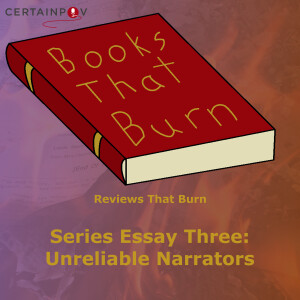
Monday Oct 07, 2024
October Daye / Inheritance - Essay Series Part Three: Unreliable Narrators
Monday Oct 07, 2024
Monday Oct 07, 2024
Hello Patrons and general audience members! Welcome to another Books That Burn essay by Robin. Thank you to Case Aiken, who receives a monthly Patron shoutout.
This is the third in a five-part essay series discussing two long-running book series by queer authors: October Daye by Seanan McGuire, and Inheritance by A.K. Faulkner. I chose these series because I love them both, they were intended from the start to be long series, neither of them are finished yet, and the authors have different structural approaches to developing each series across so many volumes. Purely coincidentally, they are both long-running contemporary fantasy series mainly set in California in or near the 2010's, with major characters named Quentin, and whose fast-healing protagonists have a tendency to quasi-adopt a gaggle of magical teenagers. After a brief moment in the 1990's, October Daye begins in earnest in 2009 and has reached 2015 as of the eighteenth book, while Inheritance is ambiguously set in the mid-to-late 2010's. Each of my essays focuses on a particular topic of importance to long series such as these two. They're designed to be intelligible on their own, and can theoretically be read in any order, but most readers will have the best experience if they start with the first essay and proceed linearly.
Unreliable Narrators - Lies and Delusions
This essay spoils major elements of the first six books of the Inheritance series by A.K. Faulkner, as well as scattered revelations and major spoilers from the first twelve books in the October Daye series by Seanan McGuire. This is a discussion of lies, delusions, and the mistakes they create, and some take longer to dispel than others. It touches briefly on themes of murder and death, as well as alluding to fictional depictions of kidnapping, torture, and abuse of children.
- Introduction (1:54)
- Who Tells The Story (3:36)
- Perspectives in October Daye (5:08)
- Perspectives in Inheritance (7:07)
- Lies in October Daye (8:36)
- Lies in Inheritance (11:50)
- Delusions in October Daye (13:38)
- Delusions in Inheritance (15:45)
- Conclusion (18:21)
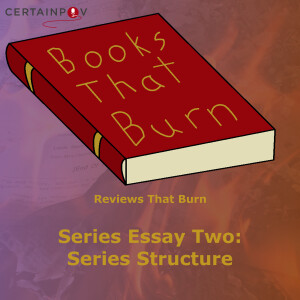
Monday Sep 02, 2024
October Daye / Inheritance - Essay Series Part Two: Series Structure
Monday Sep 02, 2024
Monday Sep 02, 2024
Hello Patrons and general audience members! Welcome to another Books That Burn essay by Robin. Thank you to Case Aiken, who receives a monthly Patron shoutout.
This is the second in a five-part essay series discussing two long-running book series by queer authors: October Daye by Seanan McGuire, and Inheritance by A.K. Faulkner. I chose these series because I love them both, they were intended from the start to be long series, neither of them are finished yet, and the authors have different structural approaches to developing each series across so many volumes. Purely coincidentally, they are both long-running contemporary fantasy series mainly set in California in or near the 2010's, with major characters named Quentin, and whose fast-healing protagonists have a tendency to quasi-adopt a gaggle of magical teenagers. After a brief moment in the 1990's, October Daye begins in earnest in 2009 and has reached 2015 as of the eighteenth book, while Inheritance is ambiguously set in the mid-to-late 2010's. Each of my essays focuses on a particular topic of importance to long series such as these two. They're designed to be intelligible on their own, and can theoretically be read in any order, but most readers will have the best experience if they start with the first essay and proceed linearly.
Series Structure - Series Arcs and Monsters of the Week
This essay spoils major elements of the first ten books of the Inheritance series by A.K. Faulkner, as well as the first six books in the October Daye series by Seanan McGuire, while lightly discussing some spoilers from later books in that series. It touches briefly on themes of murder and death, as well as alluding to fictional depictions of kidnapping, torture, and harm to children.
- What Is a Monster of the Week? (02:48)
- Monsters in Inheritance (05:52)
- Monsters in October Daye (14:30)
- Series Arcs (18:05)
- Arc Structure and October Daye (19:28)
- Seasons in Inheritance (29:51)
- A Balancing Act (34:31)
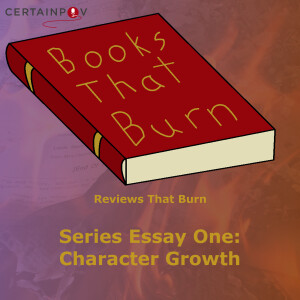
Monday Aug 05, 2024
October Daye / Inheritance - Essay Series Part One: Character Growth
Monday Aug 05, 2024
Monday Aug 05, 2024
Hello Patrons and general audience members! Welcome to another Books That Burn essay by Robin. Thank you to Case Aiken, who receives a monthly Patron shoutout.
[Full Transcript Available Here]
This is the first in a five-part essay series discussing two long-running book series by queer authors: October Daye by Seanan McGuire, and Inheritance by A.K. Faulkner. I chose these series because I love them both, they were intended from the start to be long series, neither of them are finished yet, and the authors have different structural approaches to developing each series across so many volumes. Purely coincidentally, they are both long-running contemporary fantasy series mainly set in California in or near the 2010's, with major characters named Quentin, and whose fast-healing protagonists have a tendency to quasi-adopt a gaggle of magical teenagers. After a brief moment in the 1990's, October Daye begins in earnest in 2009 and has reached 2015 as of the eighteenth book, while Inheritance is ambiguously set in the mid-to-late 2010's. Each of my essays focuses on a particular topic of importance to long series. They're designed to be intelligible on their own, and can theoretically be read in any order, but most readers will have the best experience if they start with the first essay and proceed linearly.
Character Growth - No one is perfect, especially not a protagonist in book one
This essay spoils major elements of the following books: ROSEMARY AND RUE by Seanan McGuire and JACK OF THORNS by A.K. Faulkner, as well as lightly discussing some spoilers from later books in their respective series.
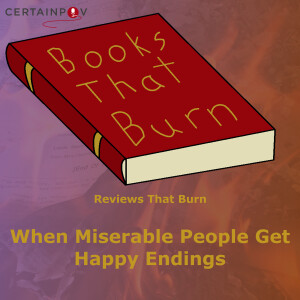
Monday Jul 01, 2024
Monday Jul 01, 2024
Hello and welcome to Books That Burn with another book essay from Robin! Thank you to Case Aiken, who receives a monthly Patron shoutout. This essay discusses (and moderately spoils) the following works by Alexis Hall:
-
ROSALINE PALMER TAKES THE CAKE (2021)
-
10 THINGS THAT NEVER HAPPENED (2023)
-
GLITTERLAND (2013)
-
WAITING FOR THE FLOOD (2024 edition)
-
FOR REAL (2015)
-
A LADY FOR A DUKE (2022)
-
BOYFRIEND MATERIAL (2020)
-
HUSBAND MATERIAL (2022)
-
THE AFFAIR OF THE MYSTERIOUS LETTER (2019)
A brief note: when I first conceptualized this essay, I thought I was going to read every published novel by Alexis Hall, then I intended to discuss at least one book from each of their series. It turns out that their catalog is so extensive that even after taking two months to read (and occasionally, reread) as much of their work as I could get my hands on, I still haven’t gotten to everything. Neither do I, on balance, want to spoil major elements of their entire catalog. Therefore, I haven’t read everything they've written, and I don’t reference every single thing that I read. However, I read enough to be sure of my point generally, and am happy with what I’ve chosen to reference specifically.
Preamble (00:00)
Content Warnings (01:29)
Introduction (01:52)
Learning to Be Okay with One's Own Flaws (5:05)
Becoming Less Reactive to the Shortcomings of Others (11:05)
Reaching for Community (14:12)
Accepting Something Already True (23:51)
Internal Reflection and Attitude Adjustment (25:49)
Change Inspired by Others (30:59)
Not Changing At All (36:24)
Conclusion: Challenging "Likeability" As A Goal (38:02)
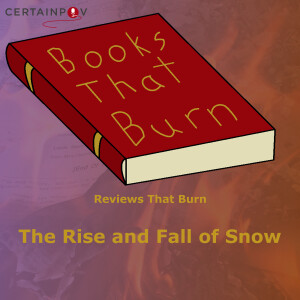
Monday Jun 03, 2024
The Rise and Fall of Snow: Why the Hunger Games prequel is good, actually
Monday Jun 03, 2024
Monday Jun 03, 2024
Welcome to another book essay from Robin! Thank you to Case Aiken, who receives a monthly Patron shoutout. This was originally going to be an essay comparing The Hunger Games series to the Uglies quartet, but I ended up with so much to say about each series on their own that instead this discusses just The Hunger Games trilogy and the role of its prequel, "The Ballad of Songbirds and Snakes".
This contains major spoilers for “The Hunger Games”, “Catching Fire”, “Mockingjay”, and “The Ballad of Songbirds and Snakes”, all by Suzanne Collins.

Monday May 06, 2024
Disability, Identity, and Allegorical Gender in SHADES AND SILVER
Monday May 06, 2024
Monday May 06, 2024
Welcome to another book essay from Robin! Thank you Case Aiken, who receives a monthly Patron shoutout.
-----
This essay contains spoilers for SHADES AND SILVER by Dax Murray.
Many attempts at gender allegories in fantasy (or sci-fi) fall apart because they try to replicate binary gender in an attempt at gender essentialism in different trappings. SHADES AND SILVER deftly avoids this by starting without gender and then never focusing on it.
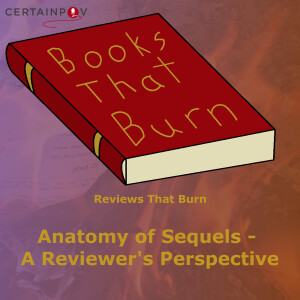
Monday Apr 01, 2024
Anatomy of Sequels - A Reviewer's Perspective
Monday Apr 01, 2024
Monday Apr 01, 2024
Sometime in the first year of my review blog, I developed a checklist which I use when reviewing sequels. It helps me qualitatively describe how they are composed, and how they interact with the surrounding books in their respective series. More recently, I added a much shorter checklist for describing the first book in a series.
Full Episode Text on Reviews That Burn
Works Cited
Ancrum, K. The Weight of the Stars. Imprint, 2019.
---. The Wicker King. Imprint, 2017.
Black, Holly. Ironside: A Modern Faerie Tale. Margaret K. McElderry Books, 2020.
---. Tithe: A Modern Faerie Tale. Margaret K. McElderry Books, 2020.
---. Valiant: A Modern Faerie Tale. Margaret K. McElderry Books, 2020.
Brown, Roseanne A. A Psalm of Storms and Silence. HarperCollins, 2021.
---. A Song of Wraiths and Ruin. HarperCollins, 2020.
Callender, Kacen. King of the Rising. Hachette UK, 2020.
---. Queen of the Conquered. Hachette UK, 2019.
Cipri, Nino. Defekt. Tordotcom, 2021.
---. Finna. Tordotcom, 2020.
Grant, Mira. Blackout. Orbit, 2012.
---. Deadline. Orbit, 2011.
---. Feed. Orbit, 2010.
---. Feedback. Orbit, 2016.
Khaw, Cassandra. A Song for Quiet. Tor.com, 2017.
---. Hammers on Bone. Tor.com, 2016.
Maxwell, Everina. Ocean’s Echo. Hachette UK, 2022.
---. Winter’s Orbit. Tor Books, 2021.
McGuire, Seanan. Be the Serpent. Astra Publishing House, 2022.
---. Sleep No More. Astra Publishing House, 2023.
---. The Innocent Sleep. Astra Publishing House, 2023.
Reid, Ava. Juniper and Thorn. Random House, 2022.
---. The Wolf and the Woodsman: A Novel. HarperCollins, 2021.
Weir, Andy. Artemis: A Novel. Ballantine Books, 2017.
---. The Martian: A Novel. Ballantine Books, 2014.
Westerfeld, Scott. Extras. Simon and Schuster, 2007.
---. Pretties. Simon and Schuster, 2008.
---. Specials. Simon and Schuster, 2011.
---. Uglies. Simon and Schuster, 2011.
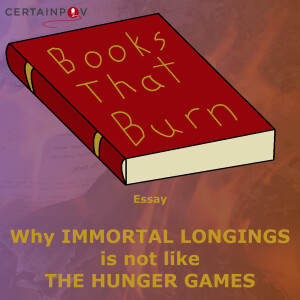
Monday Mar 04, 2024
Why ”Immortal Longings” Isn’t Like ”The Hunger Games”
Monday Mar 04, 2024
Monday Mar 04, 2024
Greetings! Welcome to Books That Burn. I'm Robin, welcome to another book essay about something that was too big of a thought to fit into a normal review, specifically: Why Immortal Longings by Chloe Gong is not like The Hunger Games. Please feel free to send us suggestions for future essays. Before I get started, I'd like to thank our Patron who gets a monthly shoutout, Case Aiken. The support of our Patrons makes this podcast (and blog) possible, and we're grateful to all of you.
When perusing other reviews of Immortal Longings by Chloe Gong, I've seen many comparisons to The Hunger Games by Suzanne Collins. This comparison is both slightly true and mostly unhelpful as a generalization, as what they have in common are either superficial genre features or not unique to The Hunger Games. I understand why the comparison occurs to people so I'd like to take it seriously. Nicole and I have covered The Hunger Games on our podcast, and I recently reviewed Immortal Longings. I'll also make some reference to an earlier book with many of the same elements as later appeared in The Hunger Games: Battle Royale by Koushun Takami. You can find both parts of our podcast discussion on that book here (Part 1, Part 2), as well as my written review of Battle Royale. While I think it does make sense to compare and contrast them, these books are not interchangeable.

